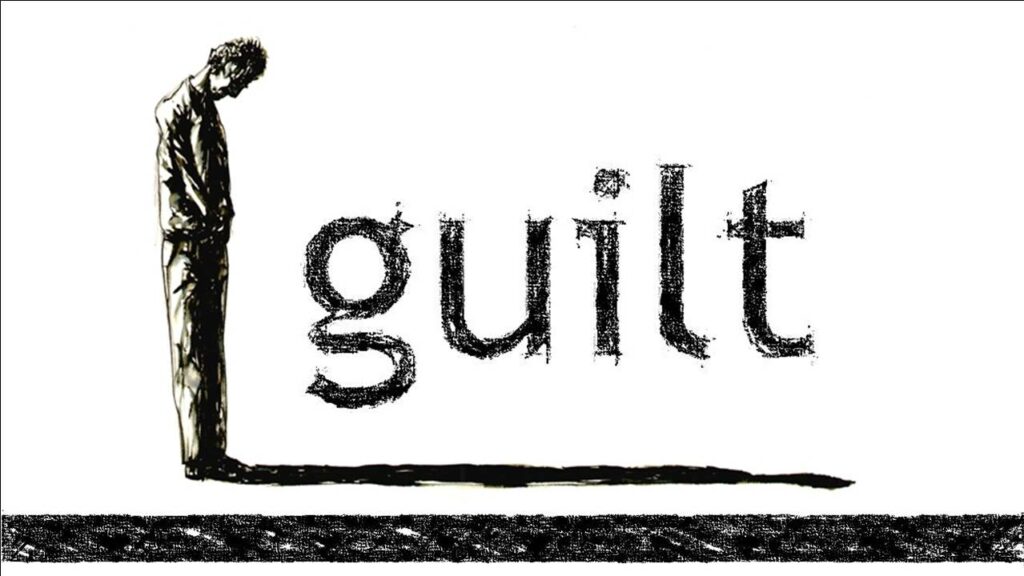You have a big presentation coming up, and you’re feeling really anxious. You know that this is a pivotal moment in your career, but it’s hard to focus on anything other than the fear of failure. What if you mess it up? What will people think of you then? These are some of the thoughts that run through your head while sitting at your desk. The problem here isn’t just what will happen if you fail, though; there’s something worse happening right now: guilt. The voice in your head telling you how much worse life would be without this new opportunity is so loud that all else seems irrelevant by comparison. If these feelings sound familiar, don’t worry! There are ways to cope with guilt using the method of therapy.
Contents
What Is Guilt?

Guilt is a natural emotion. It’s good to know if we have done something wrong or hurtful to someone else. This way, we can try not to do the same thing again in the future. Some people feel bad without knowing why. They might not know what caused them to feel this way. This type of guilt is called “intrusive guilt.”
Intrusive guilt can be caused by something we have said or done, or it might be caused by a fear that we will do something wrong in the future. It can also be caused by things that other people have said about us. Intrusive guilt makes us feel like we are always doing something wrong, even when we’re not. This can make it hard to relax and enjoy life.
Types Of Guilt
There are different types of guilt that people might feel:
- Moral guilt: This is guilt over something we have done wrong, like cheating on a test or stealing.
- Relationship guilt: This is feeling guilty because we think we haven’t been a good partner or friend.
- Parental Guilt: This is feeling guilty because we think we haven’t been good parents.
- Self-guilt: This is feeling guilty about who we are as a person. We might not be happy with ourselves and this can cause us to feel guilty all the time.
Stages Of Guilt
There are three stages of guilt:
- The first stage is feeling bad about what you did. You might feel ashamed or embarrassed and wish that the situation never happened.
- In the second stage, you realize that your actions have hurt someone else. In this case, you may try to make amends by apologizing for your behavior if possible.
- The third stage is when we start thinking about what could have happened if we did something different. We think about what might happen if we apologize. Sometimes we think about mistakes and this stops us from living. We need to forget these mistakes, but it is hard.
Therapy For Guilt

If you are struggling with guilt, therapy can help. The therapist will work with you to figure out what is causing your guilt and how to deal with it. They might ask you some questions about the situation that is making you feel guilty.
They will also help you understand why the voice in your head is so loud. This way, you can start to quiet it down and focus on the things that are important to you.
The therapist will also teach you coping skills for when intrusive thoughts come up. You might learn how to relax using deep breathing or mindfulness exercises.
You may also be given assignments to do outside of therapy sessions. These could include writing a letter of apology or talking to the person you have hurt.
Therapy can help us understand our feelings and make positive changes in our lives. If you are feeling guilty, don’t hesitate to reach out for help. There is no shame in admitting that we need assistance coping with our emotions. Talk to a therapist today and start feeling better tomorrow!
Therapy Options For Guilt
There’s something worse happening right now: guilt. The voice in your head telling you how much worse life would be without this new opportunity is so loud that all else seems irrelevant by comparison.
If these feelings sound familiar, don’t worry! There are ways to cope with guilt using the method of therapy.
- Couples’ Therapy: If you feel guilty about neglecting your partner, couples’ therapy is a great way to address the issue. Oftentimes, guilt stems from our fear of abandonment or not being good enough. Talking openly and honestly with your partner can help ease these fears and repair the relationship.
- Family Therapy: If parental guilt is an issue, family therapy can be incredibly beneficial. Parents often struggle with feelings of inadequacy and doubt when it comes to raising children. Family therapy provides a safe space for parents to express their concerns and receive guidance from a professional.
- Individual Therapy: If self-guilt is the primary issue, individual therapy might be the best option for you. In individual therapy, you will have a chance to explore your thoughts and feelings with a skilled therapist. They will help you figure out what is making you feel guilty. They will also give you ways to cope with your feelings that are effective.
- Group Therapy: Sometimes, it’s easier to address our problems as a group rather than one-on-one. In group therapy, people meet and talk to each other. They also get help from a therapist.
- Medication And Counseling: If your doctor suggests medication along with counseling sessions, don’t be afraid! Medication can help make you feel better. You should take the medication so you can feel less pain and think about recovery.
Importance Of Therapy For Guilt
Therapy is a chance to learn how you can make yourself feel better. You will have time to think about your thoughts. You can work through any guilt that you are feeling.
No matter what stage of therapy you’re going through, remember this: no one should be ashamed for being human. We all mess up sometimes because we’re human. Therapy is a great way to learn how to move past our mistakes and start feeling better again.
Practicing Self Compassion For Guilt

If you are struggling with guilt, practicing self-compassion can help. Self-compassion means treating yourself like a friend would when they make a mistake. When we feel guilty it is easy to beat ourselves up in an attempt to punish ourselves for our “bad” behavior.
This can make us feel more guilty or ashamed of what happened. And that is not good. Practicing self-compassion is good. When you are self-compassionate, you can focus on your relationships and make them better.
Self Compassion Exercises
The next time you find yourself feeling guilty because of something you did, try one of these exercises instead:
- Make peace with your mistakes: Mistakes happen; no one’s perfect. You don’t have to be perfect to deserve compassion.
- Remember that you are not your mistakes: Just because you made a mistake doesn’t mean you are a bad person. You are still worthy of love and respect.
- Understand that everyone makes mistakes: Everyone, including the people we admire and look up to, makes mistakes sometimes. This doesn’t mean they are bad people- it just means they’re human!
- Be kind to yourself: When you feel guilty, be gentle with yourself. Try not to criticize or judge yourself harshly.
- Talk to someone about how you’re feeling: It can be really helpful to talk openly about your feelings with someone who understands what you’re going through. Find somebody trustworthy and confide in them about your guilt.
- Imagine how you would comfort a friend: If somebody else made the same mistake as you, what advice might you give them? Would you remind them that everyone makes mistakes sometimes? How might this person feel if they were in your shoes right now?
- Praise yourself for recognizing and taking responsibility for your actions: Lots of people did bad things, but they did not learn from their mistakes. You are stronger than that! When we make mistakes, it is hard to recognize and learn from them. So take some time to think about how far you have come!
- Figure out who’s opinion matters most: See who is most important to you. Do what you think they would want you to do and be accountable for your mistakes.
- Focus on the positive: Remind yourself of all the good things that happened today (or this week). Think about how grateful you are for these blessings!
- Repeat: If is helpful, write out a simple statement that reminds you why it’s important to practice self-compassion when we feel guilty. Keep this statement somewhere easy to access so can pull it up whenever needed. This might include keeping printouts in your purse or with your keys at home if need be.
Practicing self-compassion takes time and effort but is very rewarding as well as effective! You’ll start feeling less guilt over time and begin to enjoy life again.
Helping Someone With Guilt Therapy

When somebody that we care about feels guilty, it is hard not to get upset. But getting angry with someone who has a mental illness can make things worse and might even push them away from you. Instead of being reactive, be proactive by suggesting therapy for guilt!
Talk To Your Loved One. You need to decide how you feel about your loved one before deciding what information you want to share. If someone is open-minded and understanding then you should feel comfortable. Share as much detail or as little detail that the person needs to help them out. It’s OK to feel bad. It’s understandable given the situation. Do not judge the person. You can come up with a plan together or find one in the book and do it right away!
Conclusion
You might be feeling guilty. You can go to a therapist and get help with your guilt. With therapy, you may find relief from your guilt. Guilt often affects people in different ways and if it is left untreated, they may become depressed or anxious. Therapy can help people with guilt. It is one of the most effective treatments. It lets you see how you act and what leads to bad thoughts about yourself. This means they have more control over what happens next. They will know how to avoid these situations in the future, which leads to fewer feelings of shame or regret connected with past events.
If you are looking for affordable Online Counseling MantraCare can help: Book a trial therapy session


